Candy Floss/Cotton Candy Inspired Technology: Polyfloss Factory
- Field Ready

- Aug 30, 2017
- 2 min read
Polyfloss is an innovative plastic recycling process, inspired by the principle of candy-floss machines. It transforms neglected waste thermoplastics into a fine plastic wool, which can then be re-used for applications including insulation, packaging, garment production and product design. This unique machine allows the establishment of contextual recycling and small scale circles of re-employment, which is rare for polymers, usually and historically dependent on at-scale manufacturing and production engineering knowledge.
Here is a video of the Polyfloss Factory explaining the technology:
Field Ready are pioneering the use of this innovative plastics recycling machine in Nepal to meet existing and anticipated humanitarian needs. Field Ready are establishing local production capacity and making raw materials from plastic waste for use in insulation for temporary shelters used by internally displaced people and landless communities. We are also working on developing other products for international aid organizations and the local market and undertaking vital materials research. The project is based on the principle of making humanitarian supplies where they are needed and addressing questions of inclusion, accessibility, livelihoods, waste, environment and many other problems that victims of emergencies and disasters face, sometimes long after the disaster is over.
Now this project has developed to be a part of a social plastics initiative being led by World Vision with Field Ready, Nepal Innovation Lab and Rural Development Initiative (RDI) as key partners. Field Ready will be leading the technical development of novel livelihoods applications using Polyfloss while Innovation Lab will be managing institutional relations, partnerships and oversight with RDI as key partners for field testing and market research.

The project has, so far, established a strong production capacity in Nepal with the machine up and running, two sites for production and six fully trained production operatives including two trainers. The project has also started extensive development and testing work for shelter and livelihoods applications for the Polyfloss material, which is why Polyfloss was brought to Nepal in the first place. Production methods, feeder materials and the raw material Polyfloss product itself are being trialed and tested with a goal of developing a customer specific evidence base. These achievements are feeding in to the growing relationships with aid organizations, businesses and other potential development partners. Significant progress has been made in all areas and the Polyfloss project should deliver some very interesting results before the end of the year. There are many ways that the use of Polyfloss can be implemented in the work that we do. We are eager to see how Polyfloss can evolve, check this space to learn about our projects.

_edited.png)



